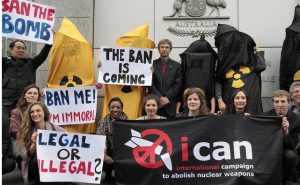DISARMAMENT & SECURITY .
Excerpts from an article by by Xanthe Hall for the International Physicians for the Prevention of Nuclear War
. . . So what did happen [at the May session of the Open-Ended Working Group – OWEG]? For the first time in many years a large number of states decided that they did not want consensus but confrontation on the issue of the illegitimacy of nuclear weapons. Tired with decades of patient discussions on micro-measures, principally for non-proliferation, and led by Argentina, Brazil, Costa Rica, Ecuador, Guatemala, Indonesia, Malaysia, Mexico and Zambia, states are now going for broke [Editor’s note: All of these countries are participants in nuclear-weapon-free zones].

ICAN protest in front of Australian embassy during the OEWG. Photo: ICAN [International Campaign to Abolish Nuclear Weapons]
Click on photo to enlarge
Despite the prospect that the nuclear-armed states are unlikely to attend, they have submitted a proposal to the OEWG to “convene a Conference in 2017, open to all States, international organizations and civil society, to negotiate a legally-binding instrument to prohibit nuclear weapons” (ban treaty) and “to report to the United Nations high-level international conference on nuclear disarmament to be convened no later than 2018 … on the progress made on the negotiation of such an instrument.”
On the final day of the OEWG resounding majority support for prohibition and the commencement of negotiations was repeatedly expressed. States are convinced that with this approach they can bring pressure to bear on the nuclear-armed and nuclear-dependent states to begin genuinely considering negotiating the elimination of their nuclear arsenals. . . .
The beauty of a stand-alone ban treaty is in its clarity, especially in terms of the moral imperative. It would leave no room for doubt as to the illegitimacy of nuclear weapons and would place any state that relies on nuclear weapons for their defence outside international law, if enough states were to support such a norm. Its entry into force could not be held hostage by nuclear-armed states reticence to ratify, as the CTBT has been. Given the present anger about the arrogance of the nuclear-armed states refusal to engage with the nuclear-free states which has been made explicit both through the boycott of the OEWG, but also through the ever hardening rhetoric of the nuclear umbrella states, it remains the most attractive option for states to pursue at the UN General Assembly in October. In this way, they can continue to put maximum pressure on the nuclear-armed states to take them seriously as the majority and therefore to respect their rights and security needs.
This debate has as much to do with redefining world order and democracy as it has to do with disarmament. As Mexico pointed out: there is nothing to be said against consensus when it is fair and reflects the truth. But when divergence exists and states with more power due to nuclear weapons wield a veto over the majority then there is nuclear oppression. Now the majority is rising up to liberate itself from this yoke with persuasive and well-thought out arguments for a comprehensive ban treaty. After more than twenty years of attending these often repetitive and boring diplomatic debates, I can hardly wait for the next one.